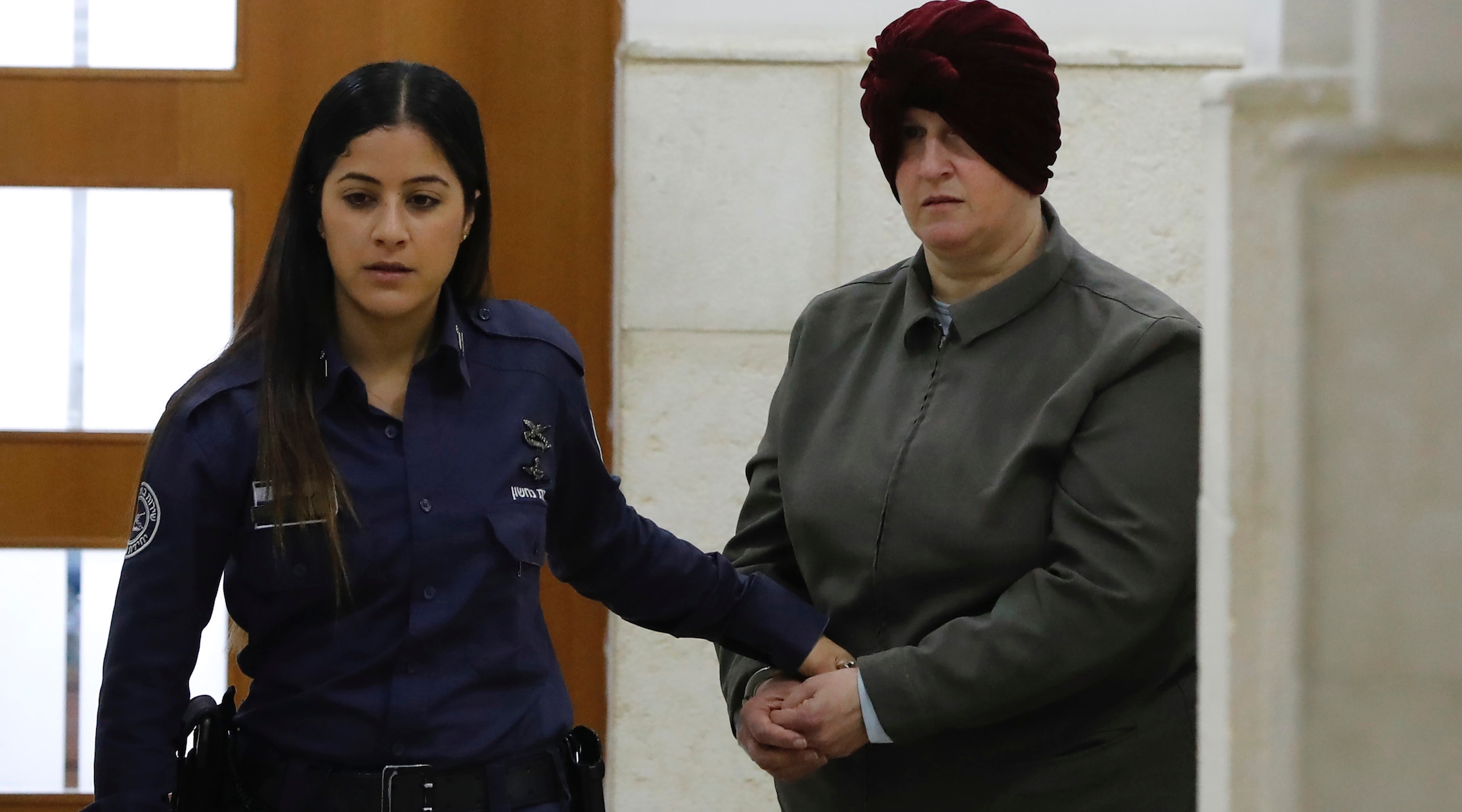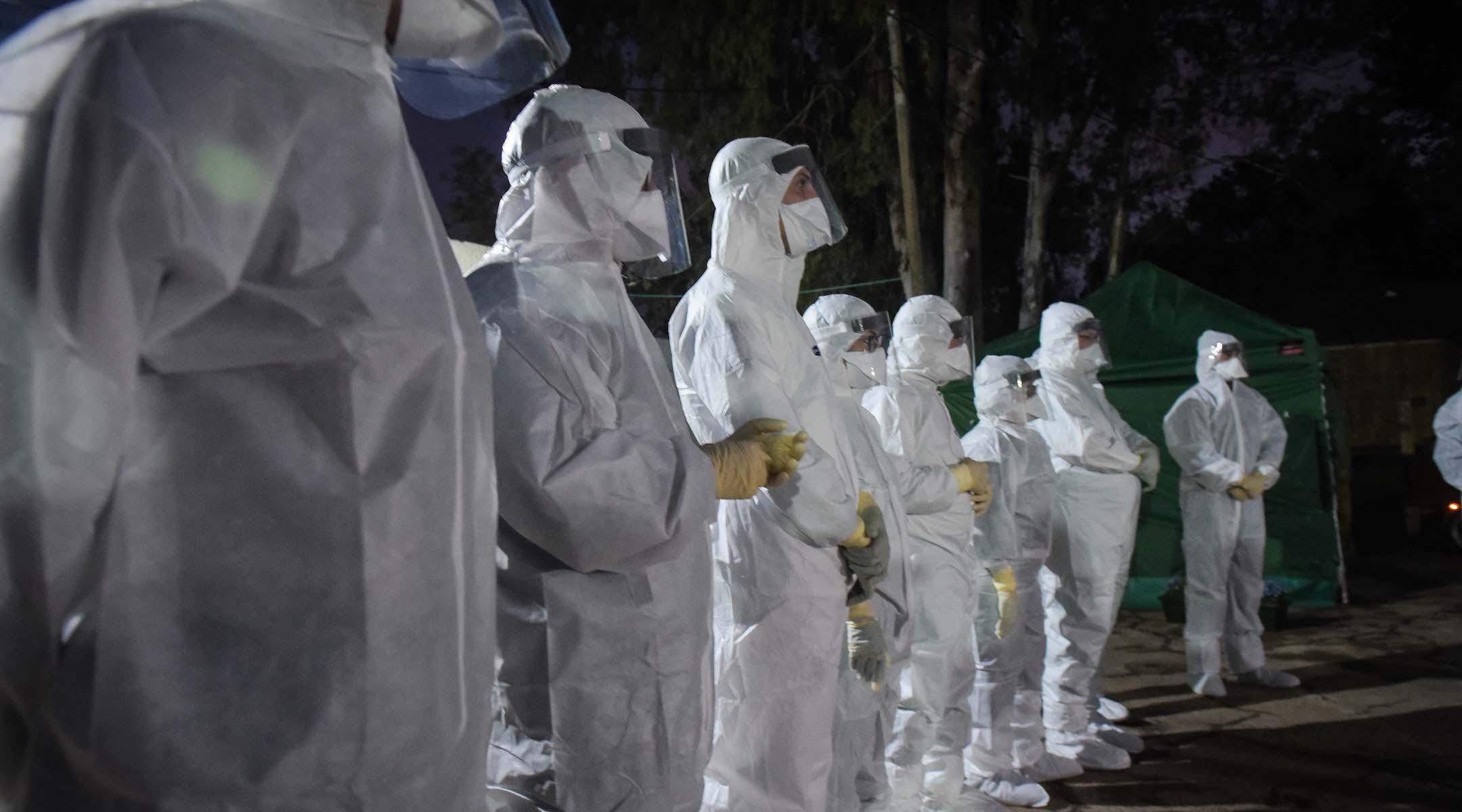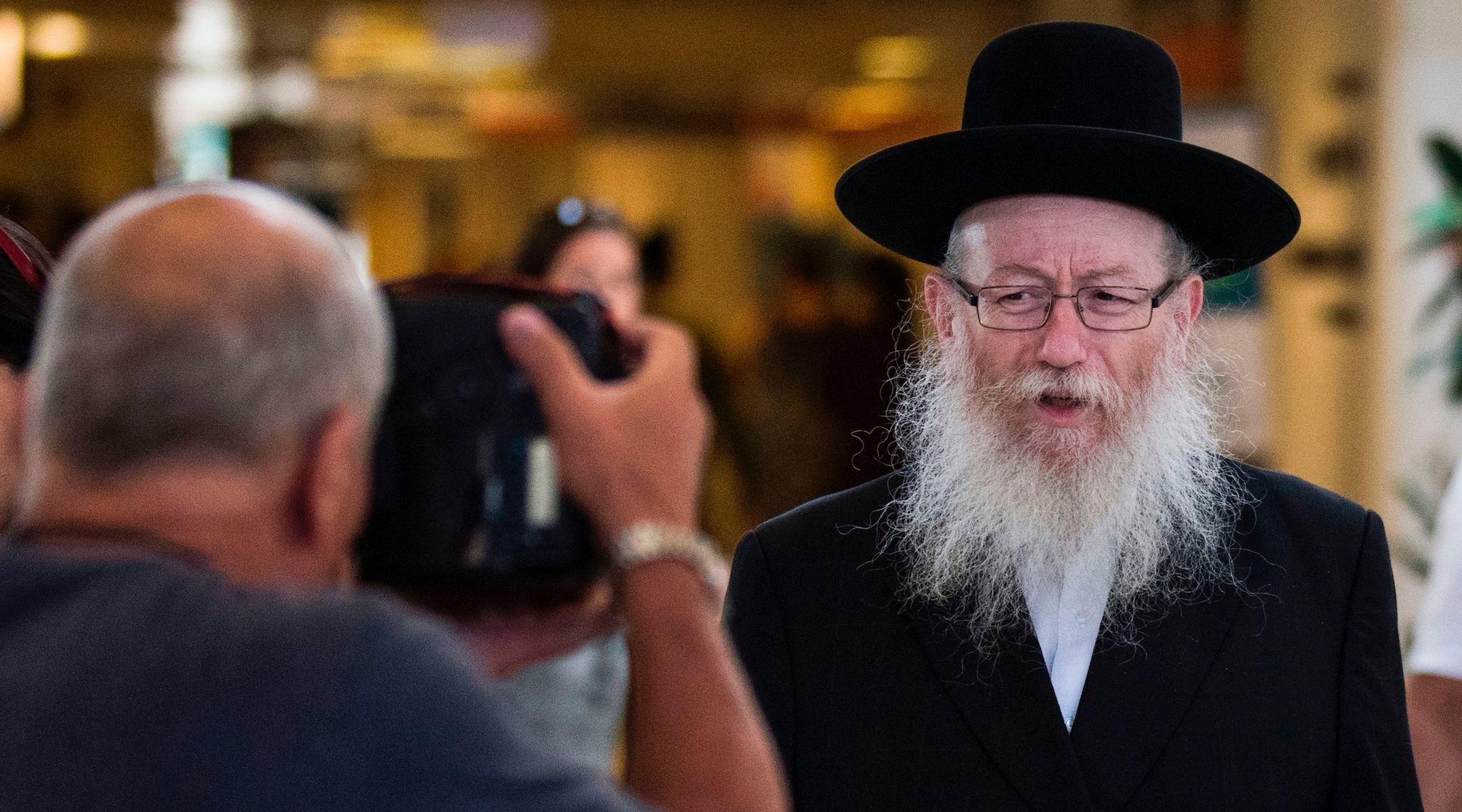BEIT SHEMESH, Israel (JTA) — Just hours after Israeli Health Minister Yaakov Litzman tested positive last week for the novel coronavirus, technicians arrived at his Jerusalem residence to deliver a smartphone and install computer equipment.
An adherent of the Ger Hasidic sect, the 71-year-old Litzman normally eschews the use of the internet at home, but special arrangements were required after his diagnosis sent him and his entire senior staff into self-isolation.
In different times, the special arrangements might be seen as underscoring Litzman’s role as a trailblazing haredi Orthodox politician — he was the first in his political faction to assume a full Cabinet position — and a testament to Israel’s complex societal makeup. But the current crisis has served to stoke haredi-secular tensions, with Litzman — fairly or not — serving as a flashpoint.
The news of Litzman’s diagnosis sent shockwaves across Israel because it meant that not only was the nation’s top health official running his department from home during a pandemic that has killed more than 54,000 globally (and at least 60 locally), but that the entire senior echelon of Israel’s government had to go home as well. Following Litzman’s diagnosis, Prime Minister Benjamin Netanyahu, Mossad Director Yossi Cohen, National Security Adviser Meir Ben-Shabbat and Hadassah Hospital CEO Zeev Rothstein all went into quarantine since they all had met with the health minister in recent days.
Litzman found himself the target of widespread anger following reports in the Hebrew press claiming that he had contracted the virus after attending an illicit prayer gathering of the sort that had been banned recently by his ministry, with one unidentified Cabinet member claiming that he had “put all of our lives in danger,” The Times of Israel reported.
Litzman denies the allegation, insisting he only attended such services when they were still permitted and was sure to keep his distance from other worshippers on those occasions.
His defense, however, speaks to a broader controversy: Litzman’s critics say he downplayed the situation initially and was slow to institute, and then enforce, social distancing measures in the haredi community, including refraining from closing synagogues and stopping prayer quorums, or minyans, in a timely fashion.
Litzman “was strikingly reluctant to acknowledge and internalize the threat posed by the pandemic,” The Times of Israel’s editor in chief, David Horovitz, wrote Friday in a column.
“He resisted the stringent limitations on public movement his ministry’s senior officials sought to impose — stalling regulations that might otherwise have come into effect early last month just before Purim, and pleading in vain with Prime Minister Benjamin Netanyahu just 10 days ago to allow synagogues to stay open for at least small groups of worshipers standing two meters [about six feet] apart,” Horovitz wrote.
But Dr. Gilad Malach, director of the Ultra-Orthodox Society Program at the Israel Democracy Institute, told reporters on Monday that he believes Litzman truly did not understand the danger of the spreading virus.
Born in a Displaced Persons camp in Germany following World War II, Litzman was raised in Brooklyn’s heavily Jewish Borough Park neighborhood, moving to Israel as a teenager and eventually becoming a close confidant and adviser to the Gerrer rebbe. It was in this capacity that he entered politics in the late 1990s, heading the Agudat Israel faction of the United Torah Judaism party and rising to become one of Israel’s most prominent haredi politicians.
Litzman has been health minister since 2019, and previously led the ministry from 2015 to 2017. He served as deputy health minister from 2009 to 2013.
At times during his relatively long tenure in the Health Ministry, Litzman has been well received by the public. Back in 2016, a Channel 2 poll found him commanding the highest satisfaction ratings of any Cabinet minister. But his public standing has been significantly dented: According to a recent poll commissioned by Israel’s Channel 12 News (Hebrew), just 22% of Israelis are satisfied with Litzman’s performance (compared to 60% of Israelis who expressed satisfaction with the performance of Health Ministry Director-General Moshe Bar Siman Tov).
Even before the current crisis, Litzman’s tenure has been marked in recent years by multiple controversies. In August, the Israel Police recommended that he be criminally indicted for bribery and aiding an alleged pedophile.

Malka Leifer, a former Australian teacher accused of dozens of cases of sexual abuse of girls at a school, arrives for a court hearing in Jerusalem, Feb. 27, 2018. Litzman has been accused of trying to aid the alleged pedophile’s case. (Ahmad Gharabli/AFP via Getty Images)
Litzman is accused of pressuring Jerusalem district psychiatrist Jacob Charnes to say that accused child molester Malka Leifer was mentally unfit to stand trial. She is accused of molesting several girls as the principal of a haredi girls’ school in Australia.
The extradition battle over Leifer, who fled Melbourne in 2008 with the assistance of haredim there after the allegations surfaced, has dragged on for several years, frustrating her accusers.
According to an investigation by Israel’s Channel 13 that aired last year, Litzman allegedly intervened improperly to aid at least 10 sex offenders from Israel’s ultra-Orthodox community.
“Yaakov Litzman is probably the most hated figure in Israel by those following the Malka Leifer case,” said Manny Waks, the CEO of Kol V’Oz, an organization that addresses child sex abuse in Jewish communities around the world.
Waks said that Litzman’s reappointment needlessly complicated otherwise friendly relations between Jerusalem and Canberra and caused a rift between the State of Israel and the Australian Jewish community, whose leaders had previously called for the minister’s ouster.
Litzman also faces bribery charges for allegedly helping to prevent the shutdown of a food business that the Health Ministry determined had serious sanitation violations. And he is accused of offering special benefits to Health Ministry employees in exchange for them preventing the Jerusalem-area restaurant and catering service from being closed.
Waks added that Litzman did deserve credit for helping to roll out the country’s medical marijuana system.
Under Litzman, who said in 2015 that he plans to make the ability to receive the medical marijuana “standard,” cannabis has become more widely available to those whose medical condition requires it.
Litzman has also worked to increase the “health basket,” the listing of the services and medications to which Israelis are entitled. In a joint statement with the Finance Ministry last December, his office announced that spending on such basic services would increase by half a billion shekels, or about $140 million, in 2020. Last year, Litzman passed a reform extending free dental care to children up to the age of 18 as part of the health basket, a boon to all Israeli families, but especially to the large families in the haredi community.
Asked by the Jewish Telegraphic Agency to comment on Litzman’s performance, several public health experts and epidemiologists declined to be interviewed.
In a letter addressed to Netanyahu last month, a group of leading Israeli medical professionals demanded Litzman’s ouster, accusing him of allowing the country’s public health system to deteriorate under his watch. A copy of the letter obtained by the local news website Ynet complained bitterly about numerous “deficiencies” brought about by the minister’s neglect.
“Despite efforts to deal with the needs, those have only increased with hospitals that are in the country’s periphery, offering inferior care while Israel itself was falling behind the rest of the world in the quality of care, while private medicine was allowed to thrive at the expense of public health services,” the doctors wrote, calling for someone with a medical background to take over.
In 2013, Bloomberg rated Israel’s health system the fourth most efficient worldwide, and it was still ranked sixth in 2018. But experts have been warning of mounting problems.

Workers inside a building at Tel Hashomer Hospital, near Tel Aviv, which was converted to receive the Israelis who were under quarantine on the cruise ship Diamond Princess in Japan due to the spread of the coronavirus, Feb. 20, 2020. (Avshalom Sassoni/Flash90)
According to a 2019 report by the Taub Center for Social Policy Studies, “there are systemic failures in planning, budgeting, and regulation by the government especially in light of the increasing needs of Israel’s aging population.”
The center reported a 22% decline in the number of hospital beds over a 15-year period and asserted that Israel’s hospital system is “characterized by a diminished ability to handle emergencies” — an issue determined by the government’s approved budget.
Litzman’s spokesman, Yaakov Izak, defended the minister’s performance, insisting he had “changed” the ministry in an extremely positive way.
“Under him, Israel is one of the highest ranked countries in terms of public health,” Izak said, “but because he is haredi there is a lot of incitement against him.”
Israel has received praise for its overall handling of the current crisis, but Litzman has received little of the credit.
While he was reluctant at first to close down schools during the early days of the crisis, his ministry has imposed increasingly severe social distancing measures in recent weeks. They include prohibiting most Israelis from traveling more than 100 meters — that’s slightly longer than a football field — from their homes and banning public prayer.
On Monday, Litzman spoke out against the closure of the haredi city of Bnei Brak, one of Israel’s coronavirus hot spots, calling it “discriminatory and humiliating,” The Times of Israel reported. He also said the allegations that haredim were helping to spread the virus were “false and dangerous.”
President Reuven Rivlin then issued a statement calling on his countrymen to stop making “false accusations that one or another group is spreading the disease, and we must certainly not attack a whole community because of the bad deeds of individuals, which happens in every society.”
Regardless of the media furor, Litzman is still in fine shape politically to remain in his post once a new Israeli government forms, according to reports on how the coalition building involving Netanyahu and rival Benny Gantz is going. Litzman reportedly was offered the position of housing minister, which would increase his areas of influence.
He strongly refused.
JTA has documented Jewish history in real-time for over a century. Keep our journalism strong by joining us in supporting independent, award-winning reporting.






